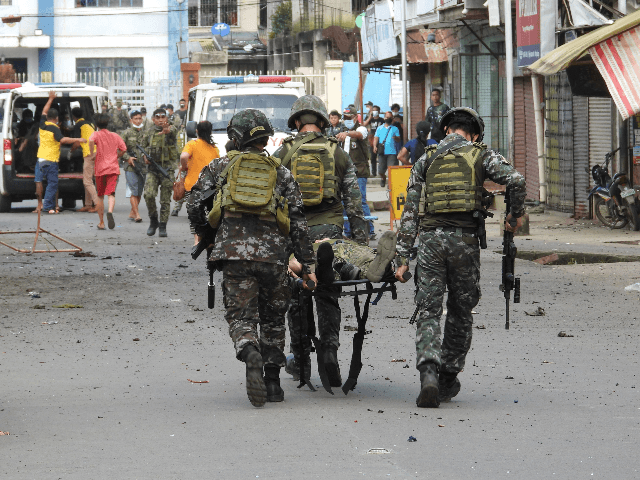Two women Islamic State terrorists blew themselves up in twin suicide attacks on Monday in the southern Philippine town of Jolo in Sulu province. Authorities counted at least 14 people, including soldiers, killed in the attacks and 75 others injured.
The first explosion, which accounted for the majority of Monday’s victims, occurred “near two parked army trucks in front of a grocery store and computer shop in a downtown plaza where the town cathedral is located,” military officials said.
In the second explosion, “the attacker blew herself up near a group of soldiers and police, killing one soldier and one police commando and wounding several others,” a military report stated.
The Philippine military is in the process of determining if the two female suicide bombers were the widows of Abu Sayyaf terrorists, according to the Associated Press (AP).
The Philippines and the U.S. have designated Abu Sayyaf a terrorist organization for violent attacks such as bombings, beheadings, and ransom kidnappings in the southwestern Philippines. The region is home to some majority Muslim islands and archipelagos, such as Sulu, in the otherwise majority Roman Catholic nation.
“Abu Sayyaf militants may have staged the suicide bombings to avenge the death of a Filipino leader of the Islamic State group in the southern Philippines following a clash with troops last month,” Philippine Army commanding general Cirilito Sobejana said Tuesday.
According to the army chief, “Hatib Hajan Sawadjaan was wounded in a July 6 gunbattle in a jungle near Patikul town in Sulu province and most likely died a few days later.” Philippine troops have been searching for Sawadjaan’s buried remains since. Sobejana said he is “90 percent sure that Sawadjaan is gone. We’re reserving the ten percent until we find his body as concrete evidence.”
A few of Abu Sayyaf’s armed factions, “including the largest one led by the Sawadjaans, are aligned with the Islamic State group,” AP noted.
“They wanted to avenge his death,” Sobejana told the AP on Tuesday. “It’s also a very desperate move because they have lost strength and wanted to create an impression that they still exist.”
Military officials accuse Sawadjaan’s nephew, Mudzrimar “Mundi” Sawadjaan, of plotting Monday’s twin suicide bombings.
Recently captured Abu Sayyaf militants have provided the Philippine army with information about Sawadjaan’s death, including how he was wounded in the July 6 gun battle and eventually died, and how a group of fellow terrorists buried him. Sawadjaan’s followers have already begun efforts to choose a replacement, Sobejana added.
“An earlier U.S. Department of Defense report to Congress said without elaborating that it believed Sawadjaan was the ‘acting emir,’ or leader, in the Philippines of the Islamic State group,” AP noted. Abu Sayyaf has long battled for independence in Mindanao, a major island in the Philippines’s south that the Islamic terrorists claim as their ancestral homeland, dating to pre-Spanish colonial rule.
Monday’s twin bombings were the latest suicide attacks in the majority Muslim province of Sulu. In January 2019, an Indonesian couple carried out a joint suicide bombing of Jolo’s Roman Catholic cathedral, killing 20 people.
Sobejana told the Philippines’ ABS-CBN digital news that one of Monday’s suicide bombers was likely “the Indonesian wife of the first-ever Filipino suicide bomber, who blew himself up outside a military camp in Indanan town, also in Sulu, in 2019.” According to Al Jazeera, there have also been reports that one of the female suicide bombers on Monday was the daughter of the Indonesian couple responsible for the January 2019 suicide bombing of Jolo’s Catholic cathedral.

COMMENTS
Please let us know if you're having issues with commenting.